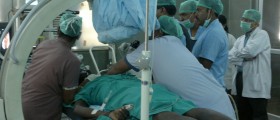
Introduction
Acute nausea and vomiting occur suddenly, worsen and lastfor only a short amount of time. In most cases they occur together, even thoughthere are exceptions.
Causes
The most common causes of acute nausea and vomiting includeviral gastroenteritis and certain types of medications. Other common causes ofacute nausea and vomiting may or may not include metabolic disorders such asadrenal insufficiency or uremia, gastroparesis, anxiety, trauma to the head,infection in abdomen, intestines or stomach, inflammation of the pancreas,inflammation of the liver, early stages of pregnancy, various types of drugsand medicines and excessive amounts of alcoholic beverages. Sometimes the acutenausea and vomiting can be accompanied by painful sensations in the stomach andthose are commonly caused by injuries, bowel twisting, bowel blockage, stomachulcers, heart attack, bacteria or parasites in the digestive system, gallstonesand inflammatory conditions which may affect kidneys, pancreas, stomach,gallbladder, appendix and several other organs. Acute nausea and vomiting maysometimes be accompanied by more saliva than usual, problems with digestion andpale skin. These symptoms are commonly causes by problems with balance, innerear disorders, seizures, migraines, swelling of the tissue which covers thebrain, bleeding in the brain, increased pressure in the brain and problems inthe autonomic nervous system.
Signs and Symptoms
It is important to inform the doctor about any history ofnausea and vomiting and for how long they continued. It is also very importantto provide detailed information on meals and dietary habits. If a personsuffered from gallstones or stomach surgery, it needs to be noted as well. The mostcommon signs and symptoms of acute nausea and vomiting include splashing soundsin the stomach and tenderness, swelling and painful sensations in the abdomen.Other possible signs and symptoms may or may not include yellowing of thewhites of the eyes and the skin, hearing loss, vertigo, low blood pressure,dizziness, slow heartbeat, unusual or fast eye movements, uncontrolledmovements, neck stiffness, muscle pain, bloody stool, diarrhea, problems witheyesight, increased eye pressure, confusion and headaches.
Treatment
It is very important to keep the body properly hydrated,because vomiting may lead to dehydration of the body. Medications commonly usedfor the treatment of acute nausea and vomiting include gastrointestinalstimulants, motion sickness medications, antiemetics and antianxiety medicines.Other procedures which may be used during the treatment of acute nausea andvomiting include nasogastric tube, intravenous fluids and gastric pacing.

















Your thoughts on this
Loading...